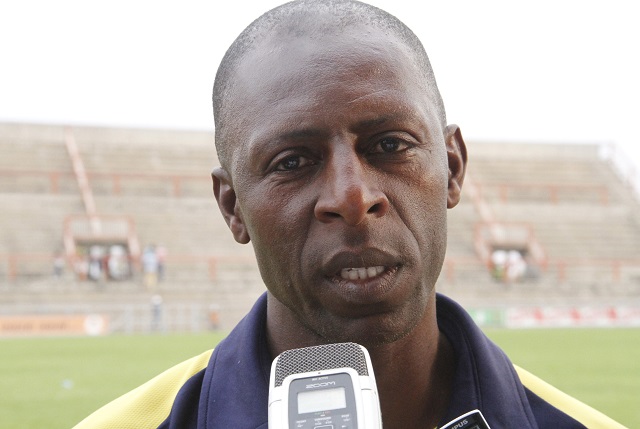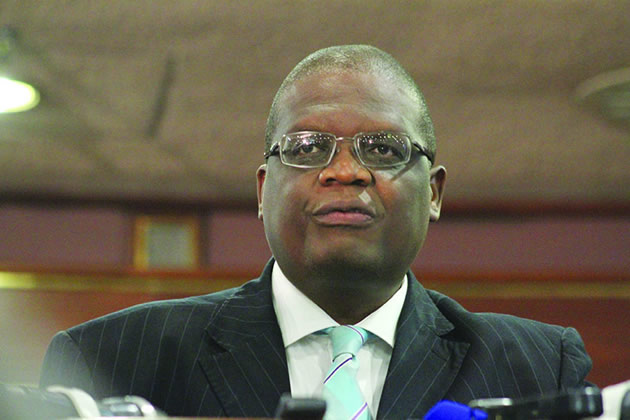Parirenyatwa elected WHO Regional Committee chair


His Excellency President Mugabe congratulates Minister of Health and Child Care Dr David Parirenyatwa
The 67th session of the World Health Organisation (WHO) Regional Committee for Africa was recently held at the Elephant Hills Hotel, Victoria Falls, Zimbabwe.
Present at the opening ceremony were President Mugabe, Minister of Health and Child Care Dr David Parirenyatwa, outgoing chairperson and Minister of Health of Cabo Verde, Dr Nascimento do Rosário; Matabeleland North provincial affairs Minister Ambassador Cain Mathema; other Zimbabwean Cabinet ministers, Government officials and ministers of health and heads of delegation of member states of the WHO African Region.
WHO director general, Dr Tedros Adhanom Ghebreyesus; WHO regional director for Africa, Dr Matshidiso Moeti; the African Union Commissioner for Social Affairs, Her Excellency Amira Elfadil; and representatives of other United Nations agencies, non-governmental organisations and partners also attended the ceremony.
Dr Parirenyatwa, who is now the chairperson of the 67th session of the WHO Regional Committee, welcomed delegates and congratulated the outgoing acting chairperson, Honourable Dr do Rosário for the work he did during his tenure as acting chairperson.
The Minister expressed his delight at the selection of Zimbabwe to host the meeting, especially as it was the first Regional Committee to be attended by the first WHO director-general from Africa, Dr Ghebreyesus.
Dr Parirenyatwa congratulated the director-general on his election and assured him of the full support of all African countries in his global assignment. He highlighted the long list of agenda items, which reflect the health challenges still facing the region despite the significant progress made in some areas.
Dr Parirenyatwa noted that addressing these challenges would require a collective approach and wished the delegates successful deliberations.
Dr do Rosário expressed his conviction that the deliberations on agenda items covering a wide range of health matters in the 67th session would help promote the health of the people in the region.
In her address, Her Excellency Amira Elfadil, the African Union Commissioner for Social Affairs, thanked WHO for the strong and growing partnership between the two organisations.
She joined previous speakers in congratulating the director-general of WHO on his election. The Commissioner emphasised that strengthening partnerships is crucial to transforming the health aspirations of the continent into reality.
Dr Moeti thanked President Mugabe and the people of Zimbabwe for hosting the meeting, for their warm hospitality and the excellent arrangements made for the Regional Committee session. She congratulated and welcomed Dr Ghebreyesus to the first Regional Committee meeting he was attending since his election as WHO director-general.
The regional director also extended a warm welcome to all the ministers of health and other delegates, especially those attending the Regional Committee for the first time.
Dr Moeti extended her condolences to the people of Sierra Leone following the tragic mudslide that occurred in that country. She assured them that WHO was working with the government to provide support in the health aspects of the response.
Dr Moeti noted that there is a growing global interest in health issues, which is helping restore health to its rightful place within the global development agenda. A case in point is the recent G20 Heads of State Summit held in Germany, where health security, health systems strengthening and antimicrobial resistance were discussed.
She also drew attention to strengthened regional commitment to the International Health Regulations. In addition, she highlighted recent regional achievements, which included the endorsement this year of the Addis Declaration on Immunisation (ADI) by African Heads of State.
Dr Moeti spoke on the growing convergence of views on the need to strengthen health security and health systems. Initiatives in this area include the approval by the World Health Assembly of the new WHO Health Emergencies Programme in May 2017; the Member States’ action in pursuing Joint External Evaluations of their IHR core capacities; the availability of new funding facilities, including the World Bank’s Global Financing Facility to promote universal health coverage; the Regional Disease Surveillance Systems Enhancement (REDISSE) project to fund IHR capacity building in ECOWAS countries; the African Development Bank support for IHR capacities; and the establishment of the Africa Centre for Disease Control and Prevention by the African Union.
Dr Moeti noted that the reform of WHO’s Health Emergencies programme was leading to faster and more effective responses to outbreaks; improved dissemination of information through weekly bulletins to all partners; and greater transparency.
This was evident in the rapid response to the recent Ebola outbreak in the Democratic Republic of Congo in May, which was brought to an end within just two months.
Similarly, WHO played a central role in coordinating the process for the cross-border control of a Lassa fever outbreak in Togo, Benin and Burkina Faso.
Dr Moeti declared that building stronger, resilient and responsive health systems is the best approach to stop outbreaks and bring equitable health care to all African people. Consequently, pursuing UHC is a top priority, and a key contributor to achieving Sustainable Development Goal 3 (Ensure healthy lives and promote wellbeing for all at all ages) and assuring progress in pursuing the Agenda 2063 as agreed by the African Union.
Accordingly, WHO in collaboration with health ministries in member states has developed a framework to guide action on advancing UHC and SDG3 as well as a monitoring system to provide information on progress. She observed that financing is fundamental to improving health systems in the region.
Dr Moeti indicated that efforts were being made to improve immunisation coverage, combat antibiotic resistance and end TB by 2030.
She said the growing burden of non-communicable diseases was also a concern for the region, noting that it was imperative to adopt measures against non-communicable diseases, including prevention, early detection and treatment.
The growing importance of social and environmental determinants underlines the need for a multi-sectoral approach with the SDGs providing an excellent platform for such collaboration.
Dr Moeti said significant progress has been made in implementing the region’s transformation agenda.
She indicated that an independent mid-term evaluation by WHO’s Global Evaluation Office in April 2017 had confirmed the progress made.
In his remarks, Dr Ghebreyesus, thanked President Mugabe for his commitment to health. He also thanked countries in the region for their support, and acknowledged the outstanding work of Dr Moeti on behalf of Africa.
He outlined his plans, including a number of “fast track” initiatives to boost effectiveness in emergencies, enhance governance, improve communication and resource mobilisation, and pursue better value for money.
Beyond these immediate priorities, the groundwork is being laid for widespread changes aimed at strengthening WHO’s capacity to meet the health challenges of the 21st century. He said he had started the process of shaping the next General Programme of Work (GPW) that will guide WHO’s work between 2019 and 2023.
Dr Ghebreyesus said it is logical for the next GPW to focus on the SDGs. While there is a single goal on health, he stressed the fact that it either contributes to, or benefits from, almost all the other goals. This implies that some of the biggest health gains will come from improvements outside the health sector. It is therefore essential that WHO engages with partners in all relevant sectors to drive progress. The next GPW proposes the following mission for WHO: ‘to keep the world safe, improve health and serve the vulnerable’.
To achieve this mission, the next GPW proposes five strategic priorities, namely: prevent, detect, and respond to epidemics, including polio elimination and combating antimicrobial resistance; provide health services in emergencies and help operate and restore health systems; support member states to strengthen health systems to achieve UHC; drive progress towards specific SDG health targets; and provide the world’s governance platform for health that will shape the complex global health architecture, a role in which WHO has authority and credibility.
He said managing and monitoring of WHO’s work will focus on outcomes and impact. Thus, a scorecard with key indicators and measurable targets will be developed to monitor the performance.
In his official opening address to the 67th session of the WHO Regional Committee for Africa, President Mugabe spoke extensively on health development in Zimbabwe and globally over the last 50 years. He noted the health challenges facing the region such as the burden of communicable and non-communicable diseases and maternal and child deaths that require concerted efforts to address.
President Mugabe urged the committee to seek explanations to the prevailing health challenges, and most importantly, to find ways and means of arresting and reversing them.
He reiterated that a sound and prosperous life is predicated on the enjoyment of good health, adding that the interplay between health and development has become evident to all. Therefore there was a need for robust investment in health, using various health financing mechanisms, for example levies on mobile communications.
President Mugabe advocated for the strengthening of health systems, including the empowerment of communities to respond to the growing number and complexity of health issues. Furthermore, he called on African governments to prioritise health in their national development agenda. President Mugabe called for health to be given deserved prominence at the sub-regional, continental and global levels.
The Regional Committee unanimously elected the following officers to serve on the Bureau of the 67th session of the Regional Committee:
Chairperson: Dr David Parirenyatwa
Minister of Health and Child Care
Zimbabwe
First Vice Chairperson: Mr André Mama Fouda
Minister of Public Health
Cameroon
Second Vice-Chairperson: Dr Raymonde Goudou Coffie
Minister of Health and Public Hygiene
Côte d’Ivoire











Comments